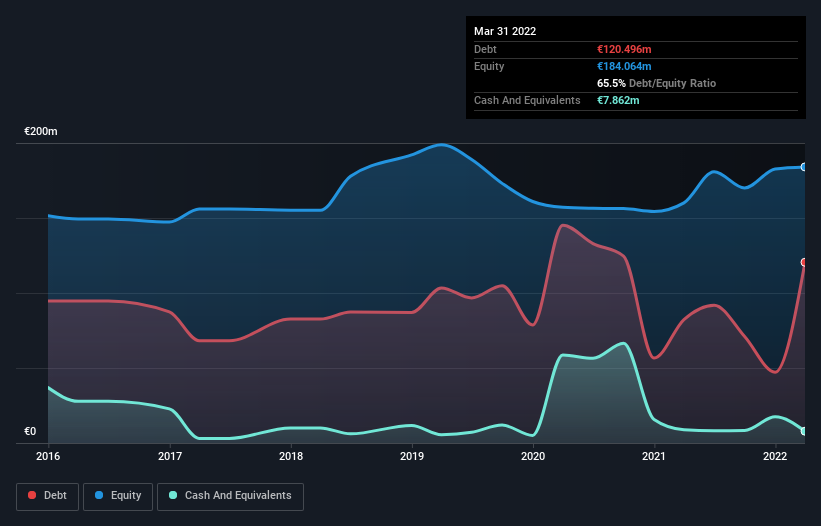
The external fund manager backed by Berkshire Hathaway's Charlie Munger, Li Lu, makes no bones about it when he says 'The biggest investment risk is not the volatility of prices, but whether you will suffer a permanent loss of capital.' So it seems the smart money knows that debt - which is usually involved in bankruptcies - is a very important factor, when you assess how risky a company is. As with many other companies KAP AG (ETR:IUR) makes use of debt. But is this debt a concern to shareholders?
What Risk Does Debt Bring?
Debt is a tool to help businesses grow, but if a business is incapable of paying off its lenders, then it exists at their mercy. In the worst case scenario, a company can go bankrupt if it cannot pay its creditors. However, a more usual (but still expensive) situation is where a company must dilute shareholders at a cheap share price simply to get debt under control. Of course, plenty of companies use debt to fund growth, without any negative consequences. The first thing to do when considering how much debt a business uses is to look at its cash and debt together.
See our latest analysis for KAP
What Is KAP's Debt?
You can click the graphic below for the historical numbers, but it shows that as of March 2022 KAP had €120.5m of debt, an increase on €82.3m, over one year. However, it does have €7.86m in cash offsetting this, leading to net debt of about €112.6m.

A Look At KAP's Liabilities
We can see from the most recent balance sheet that KAP had liabilities of €174.7m falling due within a year, and liabilities of €58.5m due beyond that. On the other hand, it had cash of €7.86m and €81.6m worth of receivables due within a year. So its liabilities total €143.7m more than the combination of its cash and short-term receivables.
When you consider that this deficiency exceeds the company's €131.3m market capitalization, you might well be inclined to review the balance sheet intently. In the scenario where the company had to clean up its balance sheet quickly, it seems likely shareholders would suffer extensive dilution. When analysing debt levels, the balance sheet is the obvious place to start. But you can't view debt in total isolation; since KAP will need earnings to service that debt. So if you're keen to discover more about its earnings, it might be worth checking out this graph of its long term earnings trend.
In the last year KAP wasn't profitable at an EBIT level, but managed to grow its revenue by 13%, to €369m. We usually like to see faster growth from unprofitable companies, but each to their own.
Caveat Emptor
Importantly, KAP had an earnings before interest and tax (EBIT) loss over the last year. Indeed, it lost €1.4m at the EBIT level. When we look at that alongside the significant liabilities, we're not particularly confident about the company. It would need to improve its operations quickly for us to be interested in it. Not least because it burned through €32m in negative free cash flow over the last year. That means it's on the risky side of things. There's no doubt that we learn most about debt from the balance sheet. However, not all investment risk resides within the balance sheet - far from it. For example KAP has 5 warning signs (and 3 which don't sit too well with us) we think you should know about.
If you're interested in investing in businesses that can grow profits without the burden of debt, then check out this free list of growing businesses that have net cash on the balance sheet.
Valuation is complex, but we're here to simplify it.
Discover if KAP might be undervalued or overvalued with our detailed analysis, featuring fair value estimates, potential risks, dividends, insider trades, and its financial condition.
Access Free AnalysisHave feedback on this article? Concerned about the content? Get in touch with us directly. Alternatively, email editorial-team (at) simplywallst.com.
This article by Simply Wall St is general in nature. We provide commentary based on historical data and analyst forecasts only using an unbiased methodology and our articles are not intended to be financial advice. It does not constitute a recommendation to buy or sell any stock, and does not take account of your objectives, or your financial situation. We aim to bring you long-term focused analysis driven by fundamental data. Note that our analysis may not factor in the latest price-sensitive company announcements or qualitative material. Simply Wall St has no position in any stocks mentioned.
About XTRA:IUR
KAP
Provides flexible films in Germany, rest of Europe, North/South America, Asia, and internationally.
Adequate balance sheet and slightly overvalued.
Market Insights
Community Narratives



